black english美国黑人英语
slave语

slave语
Slave语是一种俚语,也被称为Black English,又叫黑人英语。
它原本是一种有关黑奴们生活的口头语言,由工作、家庭和宗教相关
的专门术语组成。
这种语言在美国成为无形的文化,被称为“潜在的
英语”,是美国文化的一部分。
Slave语的主要特征就是它结合了非洲语言,并以此改变了英语的
语音,语法和词汇。
例如,它可以将动词用作名词,或将名词用作动词,使得它与标准英语的用法不同。
例如,“catch”可以用来表示一
个人的技能,而不是一个动作。
Slave语还把拉丁语,法语和西班牙语的词汇引入到英语中,这些
词汇例如“alligator”(allagator)“chicory”(chikory)和“hammock”(hameck)。
这些由拉丁语或者非洲语言派生的单词为英
语带来了全新的意义。
Slave语也改变了英语的句法,例如使用反身代词来替代一般的主
语和宾语,以及对其他简单句子的复杂替代结构。
例如,“Me and
him are going fishing”更可能变成“We gon' go fishin'.”
Slave语的传播也得到了受保护的状态,因为它对美国历史的重要性。
它是一种独特的文化和社会表征,表明黑人主义背后的文化力量,以及文学形式的重要性。
因此,Slave语可以被视为一种活跃的美国语言,具有其独特特征的文化意义。
Black_English

4.而有二文法已成为不只黑人使用,也要成为通行全 美的通则了,即如going to改成了gonna, want to改 成了wanna。此外,如out of改成了outta,kind of 改成了kinda,sort of改成了sorta,已成一新英文 文法。 5. re或e此种在快语速情况下几乎听不到的字,都被 省略了,如more成了mo(如黑人电影more money, 即缩写成mo money),for改成了fo,或 用数字"4" (音同)取代。 6."ing"之中"g"的省略,也成了全美通用的文法,如 nothing改成了nuthin', comming改成了commin'等, 只要是ing进行式就可以省略g。
(7) 一个句子可能会出现两个或更多的否定 词。Nothing 和no 分别用来代替anything 和any。 eg: Don’t know nothing about anybody. I don’t know anything about anybody. (8) 否定代词作主语,句子倒装。 eg: Didn’t nobody do it . Nobody did it . (9) 双重否定或多重否定普遍。 eg: No way no girl can’t wear no platform shoes to no amusement park .
(4)缺少主谓一致性。 eg: You is tall. You are tall. (5) 语言屈折变化的一些手段,如复数、所有 格、第三人称单数、过去式等都有不同程度 地省略。 eg: He got three cent . He got three cent s. (6) Ain’t 用来代替be + not , have + not , do + not , did + not 。 eg: He ain’t do it . He didn’t do it .
汉英颜色词“黑”和“白”之议

汉英颜色词“黑”和“白”之议On Chinese and English Color Words “Black” and “White”中文摘要我们知道,语言和文化之间有着千丝万缕的关系。
语言既是文化的一部分又是文化的一面镜子。
一个民族的语言折射出这个民族纷繁多彩的文化形态。
根植于两种不同的文化背景之中的英汉两种语言之间不可避免地存在着巨大的差异。
因此,对从事词语研究,尤其是研究英汉词语差异的人来说,探讨语言的文化差异是一个十分重要的课题,必须分析和比较词语所蕴涵的文化内涵。
本文以“黑” 和“白”两个颜色词作为研究对象,通过大量的例证,从英汉对比的角度来说明汉语的“黑” 和“白”两个颜色词和英语的“black”和“white”两个颜色词所包含的各自的褒贬国俗语义及“颜”外之意。
关键词:颜色词;褒贬国俗语义;“颜”外之意AbstractAs we know, there is a countless relationship between language and culture. Language is not only one part of culture, but also a mirror of it. A nation’s language reflects its numerous and complicated cultural form. The two kinds of language ------ English and Chinese, which rooted in two completely different cultures, inevitably exist great difference in culture. Therefore, it is a very important task for people who are engaged in words study, especially in words study between English and Chinese, to probe into the cultural differences in language. In terms of comparison and some examples, this essay explains the commendatory and derogatory terms on national connotation of the two color words “black” and “white” and their implication.Key words: Color Words; Commendatory and Derogatory Terms on National Connotation; Implication一、引言“没有一个人用纯洁而无偏见的眼光看待世界。
语言学中英术语对照

语言学中英术语对照Glossary and Index Aabbreviation 缩写词,略语Abercrombieablative 夺格,离格abstractness 抽象性accent 重音(符)accuracy 正确性accusative 宾格achievement test 成绩测试acoustic phonetics 声学语音学acquisition习得acronym 缩略语action process 动作过程actor 动作者addition 添加address form 称呼形式addressee 受话人addresser 发话人adjective 形容词adjunct 修饰成分;附加语adverb 副词affix 词缀affix hopping 词缀跳跃affixation词缀附加法affricate 塞擦音agreement 一致关系airstream 气流alliteration 头韵allomorph 词/语素变体allophone 音位变体allophonic variation 音位变体allophony音位变体现象alveolar ridge 齿龈alveolar 齿龈音ambiguity 歧义ambiguous歧义的American descriptive linguistics 美国描写语言学American English 美式英语American Indian languages 美国印第安族诸语言American structuralism 美国结构主义analogical creation 类推造字anapest 抑抑扬格anaphor 前指替代anaphoric reference 前指照应AndersonAnimal communication system 动物交际系统animate 有生命的annotation 注解antecedent 先行词;前在词anthropological 人类学的anthropological linguistics 人类语言学anticipatory coarticulation 逆化协同发音antonomasia 换称;代类名antonym 反义词antonymy 反义(关系)appellative 称谓性applied linguistics 应用语言学applied sociolinguistics 应用社会语言学appropriacy 适宜性appropriateness 适宜性;得体性approximant 无摩擦延续音Apteaptitude test 素质测试Arabic 阿拉伯语arbitrariness 任意性argument 中项;中词;主目article 冠词articulation 发音articulator 发音器官articulatory phonetics 发音语音学artificial speech 人工言语aspect 体aspirated 吐气;送气assimilation 同化associative 联想associative meaning 联想意义assonance 准压韵;半谐音Atkinson, A.M.attributive 属性;修饰语;定语auditory phonetics 听觉语音学Austin, John Langshaw authentic input 真实投入authorial style 权威风格authoring program 编程autonomy 自主性auxiliary 助词auxiliary verb 助动词Bbabbling stage 婴儿语阶段back-formation 逆构词法base component 基础部分behaver 行为者behavioural process 行为过程behaviourism 行为主义bilabial 双唇音bilabial nasal 双唇鼻音bilateral opposition 双边对立bilingualism 双语现象binary division 二分法binary feature 二分特征binary taxonomy 二分分类学binding 制约binding theory 制约论Black English 黑人英语blade 舌叶;舌面前部blank verse无韵诗blending 混成法borrowing 借用;借词bound morpheme 粘着语素bounding theory 管辖论bracketing 括号法brevity maxim 简洁准则bridging 架接British English 英式英语broad transcription 宽式音标broadening 词义扩大Brown corpus 布朗语料库Ccalculability 可计算性calque 仿造;仿造词语cancellability 可删除cardinal numeral 基数cardinal vowel 基本元音case 格case grammar格语法case theory格理论category 范畴categorical component 范畴成分causative 使役的;使投动词CD-I, compact disk-interactive 交互式激光视盘center 中心词central determiner 中心限定词chain relation 链状关系chain system 链状系统Chinese 汉语choice 选择choice system 选择系统circumstance 环境因子class 词类class shift 词性变换clause 小句;从句click 吸气音;咂音clipping 截断法closed class 封闭类closed syllable 闭音节cluster 音丛coarticulation 协同发音coda 结尾音节;符尾code 语码;信码cognitive psycholinguistics 认知心理语言学cognitive psychology 认知心理学cognitive system 认知系统coherence 相关;关联cohension 衔接co-hyponym 同下义词colligation 类连结collocative meaning 搭配意义color word 色彩词color word system 色彩词系统command 指令common core 共核common noun 普通名词communication 交际communicative competence 交际能力communicative dynamism, CD 交际性动力communicative language teaching, CLT 交际语言教学法communicative Sentence Pattern, CSP 交际性句子模式communicative syllabus 交际教学大纲communicative test 交际性测试communicative-grammatical approach 交际-语法教学法compact disk 激光盘COMPACT DISD-READ ONLY MEMORY,CD-ROM 激光视盘comparative degree 比较级competence 能力complement 补语complementary antonym 互补反义词complementary antonymy 互补反义关系complementary distribution 互补分布complex predicate 复合谓语component 成分componential analysis 成分分析composite proposition 复合命题compositionality 复合性compound 复合词;复合句comprehension 理解computation 计算computational linguistics 计算语言学computational system 计算系统computer 计算机;电脑computer-assisted learning, CAL 计算机辅助学习computer corpus 计算机语料库computer hardware 计算机硬件computer literacy 计算机操作能力computer networks 计算机网络computer system 计算机系统computer-assisted instruction, CAI 计算机辅助教学computer-assisted learning,CALL 计算机辅助语言学习conative 意动的concept 概念conceptual meaning 概念意义concord 一致(关系)concordance 共现关系concrete noun 具体名词concurrent 同时发生的conjugation 词形变化conjunct 连接副词conjunction 连接词conjunction buttressing 连接词支撑connotation 内涵consequent 跟随成分consonance 辅音韵consonant辅音constant opposition 不变对立constative 表述的constituent command 成分指令constituent proposition 成分命题constituent structure analysis 成分结构分析constituent 成分construct 编制construct validity 编制效度construction 构建constructivism 构建主义contact 接触content analysis 内容分析content validity 内容效度content word 实义词context dependent 语境依赖的context of situation 情景语境context 语境contextual analyses 语境分析contextual meaning 语境意义contrastive analysis 对比分析control theory 控制理论controlled language 有控制的语言convention 常规;规约conventional meaning 常规意义;规约意义conventionality 常规性;规约性conversational implicature 会话含义conversational maxim 会话准则converse antonymy 相反反义现象conversion 变换cooperative principle, CP 合作原则coordinate construction 并列结构coordination 并列Cordercoreferential 互参的coronal 舌面前音corpus data 语料库语料corpus (pl. corpora) 语料;素材corpus linguistics 语料库语言学context 上下文countable 可数(名词)counterfactual proposition 反事实命题couplet 对句;对联creativity 创造性;原创性Creole 克里澳尔语;混和语cross-cultural 跨文化cross-cultural communication 跨文化交际cross-linguistic 跨语言的culture 文化culturally-specific 文化特异的curriculum 教学大纲customizing 定制的Ddactyl 扬抑抑格Dani language 达尼语data retrieval, DR 资料检索database 数据库dative (case) 与格dative movement 与格移动declarative 陈述句decoding 解码deductive 演绎的deep structure 深层结构defeasibility 消除可行性definite 有定的degenerate data 无用的语料deixis 指称delicacy 精密阶denotation 外延;指称dental 齿音dentalization 齿音化derivation 衍生derivational affix. 衍生词汇derivational morphology 派生形态学description 描写descriptive adequacy 描写充分性descriptive linguistics 描写语言学design feature 结构特征determiner 限定词developing grammar 发展语法deviant 变体deviation 偏离;变异devoicing 清音化diachronic linguistics 历时语言学diachronic 历时的diacritic 附加符号;变音符diagnostic test 诊断性测试dialect 方言dialectology 方言学dialogue对话dictionary 词典digitized sound 数字化语音dimetre 二音步诗行diphthong 二合元音;双元音direct object 直接宾语direct speech, DS 直接言语direct thought, DT 直接思想directionality 方向性discourse 语篇;话语discourse analysis 语篇分析;话语分析discourse interpretation 语篇理解discrete 分离的;离散的discrete-point grammar 离散语法discrete point test 分立性测试disjunction 分离关系displacement 移位dissimilation 异化(作用) distinctive feature 区别性特征distinguisher 辩义成分distribution 分布do-insertion rule do 添加规则domain 范围;领域dorsal 舌背音;舌中音dorsum 舌背(音)double comparative 双重比较download 下载drama 戏剧drill-and-practice software 操练软件D-structure D结构dual 双数dualistic view 二分观点duality 二重性Eearly Modern English 早期现代英语economy 经济性;简洁性ejective 爆发音electronic mail 电子邮件Elizabethan English 伊利莎白时期英语ellipsis 省略(法)elliptical sentence structure 省略句子结构embedded element 嵌入成分emic 位学的emotive 感情的emphasis 强调empirical 经验主义的empirical data 经验主义的语料empirical validity 经验效度empiricism 经验主义empty category, EC 空范畴enabling skills 使成技能化encoding 编码end rhyme 末端韵endocentric construction 内向结构entailment 蕴涵entry condition 入列条件epenthesis 插音;增音equipollent opposition 均等对立equivalence 相等equivalence reliability 相等信度error analysis 错误分析EST 科技英语ethnicity identity 民族认同ethnography of communication 交际民族学etic 非位的;素的evaluation 评估event process 事件过程example-based machine translation 基于例句的机器翻译exchange error 交换错误exchange sequence 交际序列exchange structure 交际结构exhaustive 穷尽的;彻底的existent 存在物existential 存在句existential process 存在过程existential quantifier 存在数量词exocentric 外向的exocentric construction 外向结构experiential 经验的experiential function 经验功能experimental psycholinguistics 实验心理语言学explanatory adequacy 解释充分性explicit grammar instruction, EGI 明显的语法教学法expression minimization 表达最底程度expressive 表达的extended standard theory, EST 扩展标准理论extensive 引申的;扩展的extent-condition format 程度条件格式external evaluation 外部评估external qualifier 外部修饰语extrinsic sources of error 外在的错误来源eye movement 眼部移动。
非裔美国人白话英语简介

非裔美国人白话英语非裔美国人白话英语(African American Vernacular English,简写作AAVE),也常被称为美国黑人英语(African American English);非正式的叫法还包括黑人英语(Black English)、黑人白话(Black Vernacular)、黑人英语白话(Black English Vernacular,简写作BEV)或者黑人白话英语(Black Vernacular English,简写作BVE),是美国英语中非裔美国人使用的一种语言变体(方言、民族语言及族群语言)。
非专业人士有时会称其为“Ebonics”(来自单词“ebony”和“phonics”的组合)、“jive”或是“jive-talk”。
其读音在某些方面类似于美国南部英语,但在使用者中也存在一些区域性口音差别。
部分克里奥尔语学家,如威廉·斯图尔特(William Stewart)、约翰·迪拉德(John Dillard)、约翰·瑞克佛德(John Rickford)认为,非裔美国人白话英语与世界上大部分地区黑人使用的克里奥尔语方言有很多相同特征,因此非裔美国人白话英语应当是克里奥尔语的一支,[1]而其他学者则坚持认为两者并没有太大联系。
[2][3][4][5][6]在语言形式各方面,其用法受到时代、状态、话题本身及环境的影响。
有众多文学作品使用该语言变体写作,特别是美国非裔文学。
概述非裔美国人白话英语同克里奥尔英语在语言形式上有部分类似之处。
而在发音、语法结构以及词汇上,则同西非语言有相同点。
[7]非裔美国人白话英语的许多特点存在于美国南部的诸多英语变体中。
尽管这些特点中多数属于地域性特征,但其中有部分用法,例如省略“is”,多见于黑人使用者,因此这些特点多源于黑人口语。
[8]早期的非裔美国人白话英语将来自非洲的部分词汇带入到标准美国英语中,包括“gumbo”[9]、“goober”[10]、“yam”以及“banjo”。
black english语言学名词解释

black english语言学名词解释
Black English,也被称为Black Vernacular English、Black Language、African American English等,是一种英语方言,起源于非洲语言,是非洲语言在美国的演变。
这种语言在历史上被美国黑人社区广泛使用,现在仍然是美国黑人社区的重要沟通方式之一。
Black English在语音、词汇和语法等方面都与标准英语有所不同。
例如,Black English中常用“ain’t”代替“isn’t”或“haven’t”等标准英语语法结构。
此外,Black English中还有一些独特的词汇和表达方式,例如用“sugar”表示“宝贝”,用“ghetto”表示“贫民窟”等。
在语言学中,Black English的研究有助于深入了解语言接触和语言演变的过程,以及社会文化对语言的影响。
同时,对于美国黑人社区的历史和文化也有重要的认识价值。
“黑”在中西文化中的不同喻意[1]_颜色词
![“黑”在中西文化中的不同喻意[1]_颜色词](https://img.taocdn.com/s3/m/121f97e951e2524de518964bcf84b9d528ea2c65.png)
“黑”在中西文化中的不同喻意[1]_颜色词论文导读::澳大利亚等西方国家的女性则喜欢黝黑的肤色。
社会文化对颜色词词义的影响是持久的。
就存在很大的差异。
论文关键词:黑,颜色词,差异社会文化对颜色词词义的影响是持久的,根深蒂固的。
各种颜色词在不同民族中的联想与使用具有鲜明的民族文化特征,不同文化背景的人们对于颜色的价值取向是不同的,反映到文化上,就存在很大的差异。
例如,就女性而言,中国人喜欢白皙的肤色,而美国,澳大利亚等西方国家的女性则喜欢黝黑的肤色。
“black”(黑色)一词在英汉两种语言中都有些相似的联想,其中黑色与死亡的联想是最为根深蒂固。
黑色象征苦难,遭劫和悲痛。
在西方,黑色是丧服之色。
寡妇穿的衣服是全身黑色,在葬礼上人们还有头披黑纱的风俗。
在中国,吊丧悼念,古人也有在袖子上缠黑纱的风俗。
英语中black tidings 是“噩耗”或“不幸”的意思;The Black Friday 是“不幸的星期五”或“凶险不详的日子”,是耶稣受难日(复活节前的星期五),美国人Black Monday 来形容数年前美国股票暴跌,美元贬值的那个星期一。
“black”还象征着黑暗和罪恶,不好的,坏的颜色词,邪恶的,反面的。
在芭蕾舞剧《天鹅湖》中的黑天鹅代表邪恶,欺诈和仇恨。
在米尔顿(Milton)的话剧《失乐园》(paradiselost)里,撒旦(Satan)和其他的天使都是白色的,但是当撒旦因触怒了上帝而被逐出天堂流放到地狱后,他就被烧成了一个黑色的魔鬼。
black hats (黑帽子)指坏人,是因为早期无声影片中,导演们让主人公戴白帽子,而让他们的敌人戴黑帽子。
Black sheep 指“败家子”或者“害群之马”,据说是因为英国农业是以畜牧业为主,黑绵羊没有白绵羊的价格高,羊群中的黑绵羊是不受欢迎的。
black deals 指“恶行”,blackart 指“巫术”,black market 指“黑市”或“非法交易”,black list 是“黑名单”。
AAVE
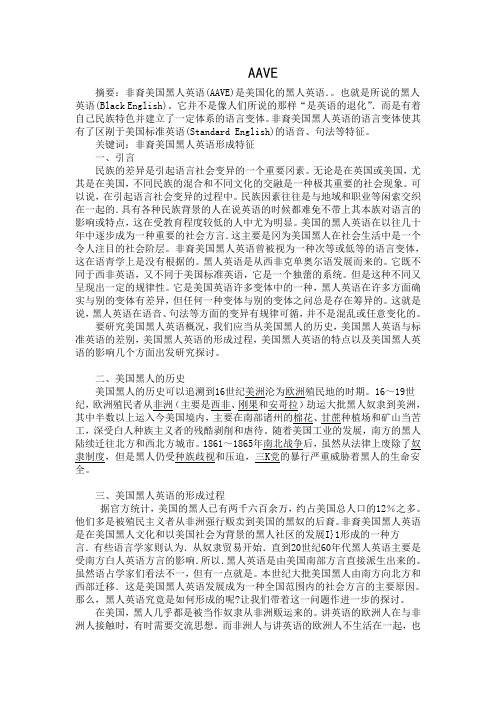
AAVE摘要:非裔美国黑人英语(AAVE)是美国化的黑人英语.。
也就是所说的黑人英语(Black English)。
它并不是像人们所说的那样“是英语的退化”.而是有着自己民族特色并建立了一定体系的语言变体。
非裔美国黑人英语的语言变体使其有了区剐于美国标准英语(Standard English)的语音、句法等特征。
关键词:非裔美国黑人英语形成特征一、引言民族的差异是引起语言社会变异的一个重要冈素。
无论是在英国或美国,尤其是在美国,不同民族的混合和不同文化的交融是一种极其重要的社会现象。
可以说,在引起语言社会变异的过程中。
民族因素往往是与地域和职业等闲索交织在一起的.具有各种民族背景的人在说英语的时候都难免不带上其本族对语言的影响或特点,这在受教育程度较低的人中尤为明显。
美国的黑人英语在以往几十年中逐步成为一种重要的社会方言.这主要是冈为美国黑人在社会生活中是一个令人注目的社会阶层。
非裔美国黑人英语曾被视为一种次等或低等的语言变体,这在语青学上是没有根据的。
黑人英语是从西非克单奥尔语发展而来的。
它既不同于西非英语,又不同于美国标准英语,它是一个独蕾的系统。
但是这种不同又呈现出一定的规律性。
它是美国英语许多变体中的一种,黑人英语在许多方面确实与别的变体有差异,但任何一种变体与别的变体之问总是存在筹异的。
这就是说,黑人英语在语音、句法等方面的变异有规律可循,并不是混乱或任意变化的。
要研究美国黑人英语概况,我们应当从美国黑人的历史,美国黑人英语与标准英语的差别,美国黑人英语的形成过程,美国黑人英语的特点以及美国黑人英语的影响几个方面出发研究探讨。
二、美国黑人的历史美国黑人的历史可以追溯到16世纪美洲沦为欧洲殖民地的时期。
16~19世纪,欧洲殖民者从非洲(主要是西非、刚果和安哥拉)劫运大批黑人奴隶到美洲,其中半数以上运入今美国境内,主要在南部诸州的棉花、甘蔗种植场和矿山当苦工,深受白人种族主义者的残酷剥削和虐待。
黑人用英语怎么说
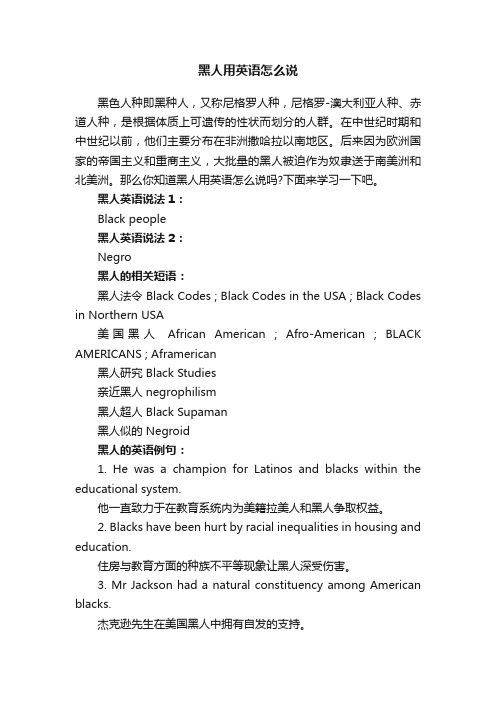
黑人用英语怎么说黑色人种即黑种人,又称尼格罗人种,尼格罗-澳大利亚人种、赤道人种,是根据体质上可遗传的性状而划分的人群。
在中世纪时期和中世纪以前,他们主要分布在非洲撒哈拉以南地区。
后来因为欧洲国家的帝国主义和重商主义,大批量的黑人被迫作为奴隶送于南美洲和北美洲。
那么你知道黑人用英语怎么说吗?下面来学习一下吧。
黑人英语说法1:Black people黑人英语说法2:Negro黑人的相关短语:黑人法令 Black Codes ; Black Codes in the USA ; Black Codes in Northern USA美国黑人African American ; Afro-American ; BLACK AMERICANS ; Aframerican黑人研究 Black Studies亲近黑人 negrophilism黑人超人 Black Supaman黑人似的 Negroid黑人的英语例句:1. He was a champion for Latinos and blacks within the educational system.他一直致力于在教育系统内为美籍拉美人和黑人争取权益。
2. Blacks have been hurt by racial inequalities in housing and education.住房与教育方面的种族不平等现象让黑人深受伤害。
3. Mr Jackson had a natural constituency among American blacks.杰克逊先生在美国黑人中拥有自发的支持。
4. The police haven't really done anything for the black community in particular.警方并未真正特意为黑人群体做什么.5. Some Afro-Caribbeans are rejecting the whole race relations industry.一些加勒比黑人在抵制整个种族关系运动。
谈中英颜色词“黑色”的文化涵义及其翻译
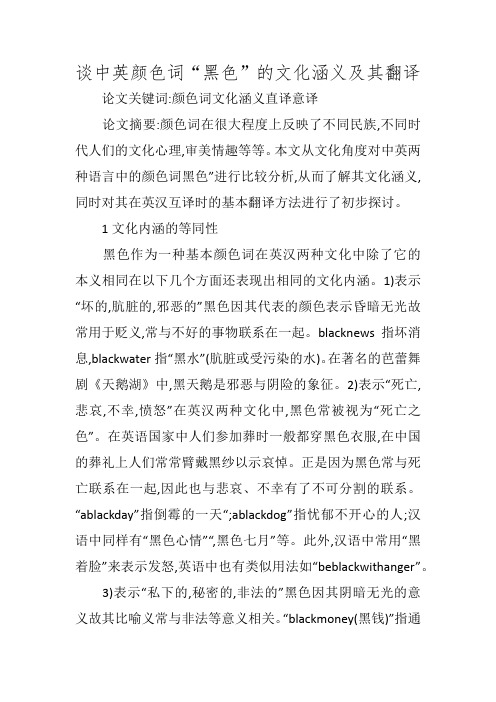
谈中英颜色词“黑色”的文化涵义及其翻译论文关键词:颜色词文化涵义直译意译论文摘要:颜色词在很大程度上反映了不同民族,不同时代人们的文化心理,审美情趣等等。
本文从文化角度对中英两种语言中的颜色词黑色”进行比较分析,从而了解其文化涵义,同时对其在英汉互译时的基本翻译方法进行了初步探讨。
1文化内涵的等同性黑色作为一种基本颜色词在英汉两种文化中除了它的本义相同在以下几个方面还表现出相同的文化内涵。
1)表示“坏的,肮脏的,邪恶的”黑色因其代表的颜色表示昏暗无光故常用于贬义,常与不好的事物联系在一起。
blacknews指坏消息,blackwater指“黑水”(肮脏或受污染的水)。
在著名的芭蕾舞剧《天鹅湖》中,黑天鹅是邪恶与阴险的象征。
2)表示“死亡,悲哀,不幸,愤怒”在英汉两种文化中,黑色常被视为“死亡之色”。
在英语国家中人们参加葬时一般都穿黑色衣服,在中国的葬礼上人们常常臂戴黑纱以示哀悼。
正是因为黑色常与死亡联系在一起,因此也与悲哀、不幸有了不可分割的联系。
“ablackday”指倒霉的一天“;ablackdog”指忧郁不开心的人;汉语中同样有“黑色心情”“,黑色七月”等。
此外,汉语中常用“黑着脸”来表示发怒,英语中也有类似用法如“beblackwithanger”。
3)表示“私下的,秘密的,非法的”黑色因其阴暗无光的意义故其比喻义常与非法等意义相关。
“blackmoney(黑钱)”指通过违法手段得到的不义之财,类似的还有“blackmarket(黑市)、blacklist(黑名单)black-hearted(黑心的,邪恶的)、blackdeeds(恶劣行径)。
汉语中同样有“黑户、黑钱、黑货、黑店”等等。
4)表示“庄重、正义”黑色除了表示消极意义也表示积极意义。
在我国古代,黑色是一种尊重和庄重的颜色,是夏朝和秦朝所崇尚的正色,缁衣(黑色帛做的衣服)则是卿士听朝的正服。
因黑色和铁的颜色相似,我国古人常将铁的坚硬特征与黑色联系起来,用黑色来象征“刚直、公正无私”,因此在中国戏曲脸谱艺术中,往往用黑色脸谱来象征历史人物的秉公执法,刚正不阿等高尚品质,最典型的代表是宋朝的包拯。
黑人英语特点
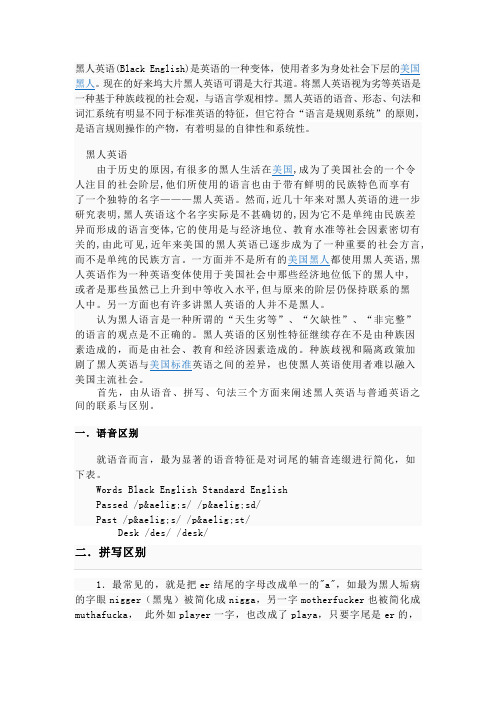
黑人英语(Black English)是英语的一种变体,使用者多为身处社会下层的美国黑人。
现在的好来坞大片黑人英语可谓是大行其道。
将黑人英语视为劣等英语是一种基于种族歧视的社会观,与语言学观相悖。
黑人英语的语音、形态、句法和词汇系统有明显不同于标准英语的特征,但它符合“语言是规则系统”的原则,是语言规则操作的产物,有着明显的自律性和系统性。
黑人英语由于历史的原因,有很多的黑人生活在美国,成为了美国社会的一个令人注目的社会阶层,他们所使用的语言也由于带有鲜明的民族特色而享有了一个独特的名字———黑人英语。
然而,近几十年来对黑人英语的进一步研究表明,黑人英语这个名字实际是不甚确切的,因为它不是单纯由民族差异而形成的语言变体,它的使用是与经济地位、教育水准等社会因素密切有关的,由此可见,近年来美国的黑人英语已逐步成为了一种重要的社会方言,而不是单纯的民族方言。
一方面并不是所有的美国黑人都使用黑人英语,黑人英语作为一种英语变体使用于美国社会中那些经济地位低下的黑人中,或者是那些虽然已上升到中等收入水平,但与原来的阶层仍保持联系的黑人中。
另一方面也有许多讲黑人英语的人并不是黑人。
认为黑人语言是一种所谓的“天生劣等”、“欠缺性”、“非完整”的语言的观点是不正确的。
黑人英语的区别性特征继续存在不是由种族因素造成的,而是由社会、教育和经济因素造成的。
种族歧视和隔离政策加剧了黑人英语与美国标准英语之间的差异,也使黑人英语使用者难以融入美国主流社会。
首先,由从语音、拼写、句法三个方面来阐述黑人英语与普通英语之间的联系与区别。
一.语音区别就语音而言,最为显著的语音特征是对词尾的辅音连缀进行简化,如下表。
Words Black English Standard EnglishPassed /pæs/ /pæsd/Past /pæs/ /pæst/Desk /des/ /desk/1.最常见的,就是把er结尾的字母改成单一的"a",如最为黑人垢病的字眼nigger(黑鬼)被简化成nigga,另一字motherfucker也被简化成muthafucka,此外如player一字,也改成了playa,只要字尾是er的,都可照此一语法改成a(例如刚才的例子motherfucka便是由motherfucker 演变而来)。
美国黑人英语

1.1The Derivation of Afro-AmericanThe history of Afro-American can be traced back to the 16th century when America was still a colony of European. From 16-19th century , the European captured many black slaves from west Africa, Congo and Angola and selled them to American . Most of those slaves were brougght to the United States and forced to work in cotton fields, sugercane fields and mines in the southern of the U.S.A. At the same time ,they suffered from brutal exploition and abuse by the white racist. With the development of industry, many blacks moved to the north and northwest states from south. After the Civil War which happened in 1861-1865,slavery was annulled legally,but the Negro were still suffering under racial discrimination and oppression from racist. The blacks couldn’t be treated equally as white in many aspects , such as in politics , education, employment,etc. According a survey made in 1970, in the United States , twenty percent of the families under poverty line were white while eighty percent of them were Negro. Unemployment in black was four times even six or seven times higher than that in white , and the salary of black workers was only half even one third of that of white workers. The black were in the bottom in American society and they were constantly be threatened by unemployment, poverty, diseases and death.So they have been in the fight with racial discrimination and oppression for more rights for many years , and their action are suppored by the progressives in the world.1.2. Definition of Black EnglishBecause many black slaves were from different rigions of Africa and they spoke different languages, in order to comminicate with each other and with the slave owner they had to find a common language. But they couldn’t learn right pronunication and grammer rules of Engkish without normal education and the English they used also be influenced by their own dialect. So sometimes Black English is also called Pidgin.In the United States, the term Black English usually refers to the everyday spoken varieties of English used by African Americans, especially of the working class in urban neighborhoods or rural communities. Linguists generally prefer the term African American V ernacular English, although some use the term Ebonics, which was widespread used in the late 1990s. It is an error to suppose that Black English is spoken by all African Americans regardless of their background. In fact, the English spoken by African Americans is highly varied-as varied as the English spoken by any other racial or ethnic group. Sometimes Black English is used to refer to other varieties of English spoken by Black people outside of the United States, as in the Caribbean and the United Kingdom.1.3The Development of Black EnglishThe origion of Black English can be traced to the period of slavery and the slave trade . So the history of Black English started from about 1619 when a Dutch vessel landed in Jamestown with a cargo of twenty Africans. During the slave trade , the colonists collected slaves from different parts of Africa,so the slaves cannot communicate with each other and it was impossible for them to overthrow the colonists.In 1744, a caption of a slave ship , William Smith said :“The safest way to trade is to trade with the different nations, on either side of the river, and having some of very sort on board. There will be no more likelihood of their success in a plot, than of finishing the Tower of Babel.”At the same time, all the slaves had to communicate with their masters to some degree. So they had to learn some elementary English vocabulary. Then English became the commom language that all slaves knew and they gradually developed a Pidgin language with the simple English vocabulary they had learned . After the children of the slaves were born, they must be taught this African- English Pidgin . It was necessary that they were able to communicate with other saves and their masters .There was very littleevidence the speech of slaves from 17th century, however, in 1692, Justice Hathorne recorded some words of Tituba , who was an African slaves from the island of Barbadosin the British West Tndies . His words were “He tell me he God.”The vocabulary of thesentence were English , but the grammar rule and structure were congrous with that of West languages which was identified by Simtherman . In the 18th century , more records of slaves’ were produced by some writers and linguistist . J.L.Pillard said that “By 1715 there clearly was an African Pidgin English known on a worldwide scale.”He proved this claim by quoting Defoe’s words in his work in his work The Life of Colonel Jaque. “Y es , yes ….me know , me know but me want speak , me tell something . O! Me no let him makee de great mastr angry. ” A Viriginia slave said in the book. Just like Tituba’s statement the grammar rules and structure of this statement were belong to the west African language . Other evidence in tracing the development of Black English were lied in newspapers which repored runaway slaves . The speech of runaway slaves played a very important role in helping the master to locating and identify a runaway slave . Those slaves who could runaway successfully were likely to be thoes who knew well standard Enlish.During the Civil War period , writers such as Harriet Beecher Stowe and Thomes Halliburtone produced many works that showed their knowledge of the exitence of Black English . It was really safe to assume that those Blacks who did speak Black English far outnumbered those who spoke Standard English . Under this condition , it is certain that Black English will continue to flourish .2.1 Analytsis on Black English Compared with Standard EnglishIn people traditional view , that Black English has been considered as second-class or loe-level of language variation , which in linguistics is different from the Standard language of the United States of America . The difference showed that Black English is same with Standard American English that has complex structure , system , grammar rule and its own characteristics in pronunciation and vocabulary .。
美国黑人英语的一些特点
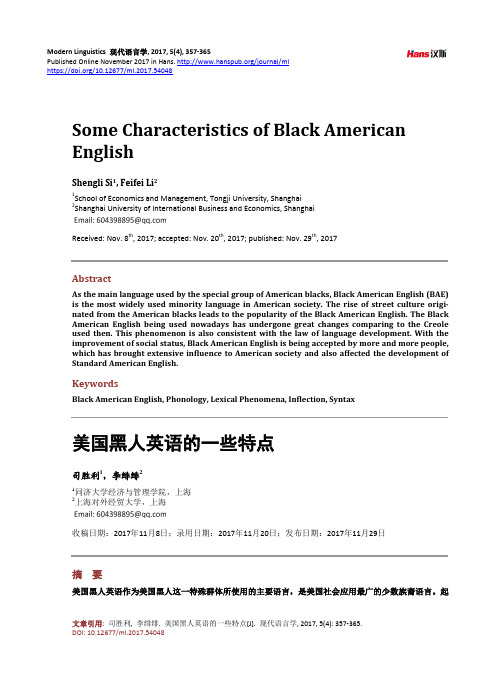
Modern Linguistics 现代语言学, 2017, 5(4), 357-365Published Online November 2017 in Hans. /journal/mlhttps:///10.12677/ml.2017.54048Some Characteristics of Black AmericanEnglishShengli Si1, Feifei Li21School of Economics and Management, Tongji University, Shanghai2Shanghai University of International Business and Economics, ShanghaiReceived: Nov. 8th, 2017; accepted: Nov. 20th, 2017; published: Nov. 29th, 2017AbstractAs the main language used by the special group of American blacks, Black American English (BAE) is the most widely used minority language in American society. The rise of street culture origi-nated from the American blacks leads to the popularity of the Black American English. The Black American English being used nowadays has undergone great changes comparing to the Creole used then. This phenomenon is also consistent with the law of language development. With the improvement of social status, Black American English is being accepted by more and more people, which has brought extensive influence to American society and also affected the development of Standard American English.KeywordsBlack American English, Phonology, Lexical Phenomena, Inflection, Syntax美国黑人英语的一些特点司胜利1,李绯绯21同济大学经济与管理学院,上海2上海对外经贸大学,上海收稿日期:2017年11月8日;录用日期:2017年11月20日;发布日期:2017年11月29日摘要美国黑人英语作为美国黑人这一特殊群体所使用的主要语言,是美国社会应用最广的少数族裔语言。
英语如何表达肤色、人种?
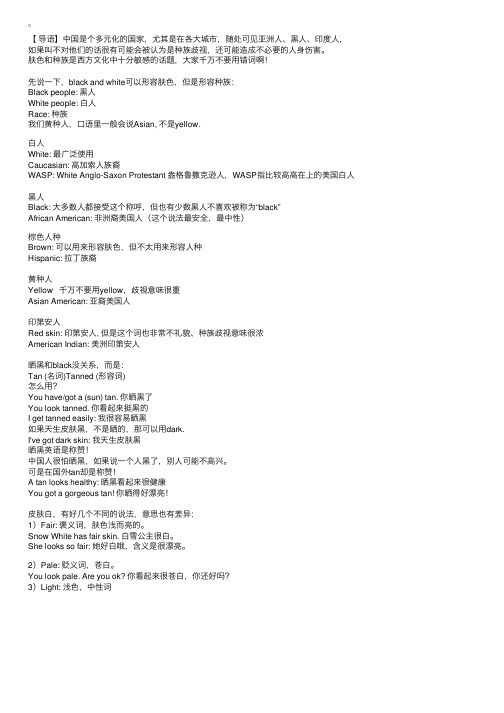
【导语】中国是个多元化的国家,尤其是在各⼤城市,随处可见亚洲⼈、⿊⼈、印度⼈,如果叫不对他们的话很有可能会被认为是种族歧视,还可能造成不必要的⼈⾝伤害。
肤⾊和种族是西⽅⽂化中⼗分敏感的话题,⼤家千万不要⽤错词啊!先说⼀下,black and white可以形容肤⾊,但是形容种族:Black people: ⿊⼈White people: ⽩⼈Race: 种族我们黄种⼈,⼝语⾥⼀般会说Asian, 不是yellow.⽩⼈White: 最⼴泛使⽤Caucasian: ⾼加索⼈族裔WASP: White Anglo-Saxon Protestant 盎格鲁撒克逊⼈,WASP指⽐较⾼⾼在上的美国⽩⼈⿊⼈Black: ⼤多数⼈都接受这个称呼,但也有少数⿊⼈不喜欢被称为“black”African American: ⾮洲裔美国⼈(这个说法最安全,最中性)棕⾊⼈种Brown: 可以⽤来形容肤⾊,但不太⽤来形容⼈种Hispanic: 拉丁族裔黄种⼈Yellow 千万不要⽤yellow,歧视意味很重Asian American: 亚裔美国⼈印第安⼈Red skin: 印第安⼈, 但是这个词也⾮常不礼貌、种族歧视意味很浓American Indian: 美洲印第安⼈晒⿊和black没关系,⽽是:Tan (名词)Tanned (形容词)怎么⽤?You have/got a (sun) tan. 你晒⿊了You look tanned. 你看起来挺⿊的I get tanned easily: 我很容易晒⿊如果天⽣⽪肤⿊,不是晒的,那可以⽤dark.I've got dark skin: 我天⽣⽪肤⿊晒⿊英语是称赞!中国⼈很怕晒⿊,如果说⼀个⼈⿊了,别⼈可能不⾼兴。
可是在国外tan却是称赞!A tan looks healthy: 晒⿊看起来很健康You got a gorgeous tan! 你晒得好漂亮!⽪肤⽩,有好⼏个不同的说法,意思也有差异:1)Fair: 褒义词,肤⾊浅⽽亮的。
黑人英语汉译初探
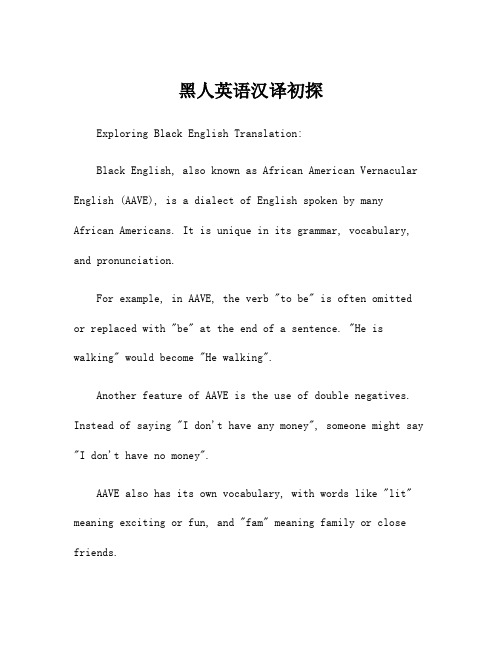
黑人英语汉译初探Exploring Black English Translation:Black English, also known as African American Vernacular English (AAVE), is a dialect of English spoken by many African Americans. It is unique in its grammar, vocabulary, and pronunciation.For example, in AAVE, the verb "to be" is often omitted or replaced with "be" at the end of a sentence. "He is walking" would become "He walking".Another feature of AAVE is the use of double negatives. Instead of saying "I don't have any money", someone might say "I don't have no money".AAVE also has its own vocabulary, with words like "lit" meaning exciting or fun, and "fam" meaning family or close friends.While AAVE is often seen as "incorrect" or "uneducated"by some, it has its own rich history and culture. It has been influenced by African languages, as well as the experiencesof African Americans throughout history.初探黑人英语汉译:黑人英语,也称非裔美国人常用英语(AAVE),是许多非裔美国人所讲的一种英语方言,其语法,词汇和发音都很独特。
黑人英语
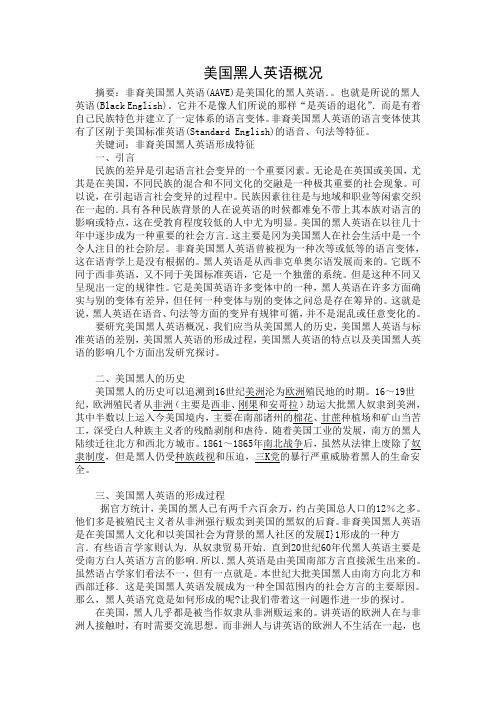
美国黑人英语概况摘要:非裔美国黑人英语(AAVE)是美国化的黑人英语.。
也就是所说的黑人英语(Black English)。
它并不是像人们所说的那样“是英语的退化”.而是有着自己民族特色并建立了一定体系的语言变体。
非裔美国黑人英语的语言变体使其有了区剐于美国标准英语(Standard English)的语音、句法等特征。
关键词:非裔美国黑人英语形成特征一、引言民族的差异是引起语言社会变异的一个重要冈素。
无论是在英国或美国,尤其是在美国,不同民族的混合和不同文化的交融是一种极其重要的社会现象。
可以说,在引起语言社会变异的过程中。
民族因素往往是与地域和职业等闲索交织在一起的.具有各种民族背景的人在说英语的时候都难免不带上其本族对语言的影响或特点,这在受教育程度较低的人中尤为明显。
美国的黑人英语在以往几十年中逐步成为一种重要的社会方言.这主要是冈为美国黑人在社会生活中是一个令人注目的社会阶层。
非裔美国黑人英语曾被视为一种次等或低等的语言变体,这在语青学上是没有根据的。
黑人英语是从西非克单奥尔语发展而来的。
它既不同于西非英语,又不同于美国标准英语,它是一个独蕾的系统。
但是这种不同又呈现出一定的规律性。
它是美国英语许多变体中的一种,黑人英语在许多方面确实与别的变体有差异,但任何一种变体与别的变体之问总是存在筹异的。
这就是说,黑人英语在语音、句法等方面的变异有规律可循,并不是混乱或任意变化的。
要研究美国黑人英语概况,我们应当从美国黑人的历史,美国黑人英语与标准英语的差别,美国黑人英语的形成过程,美国黑人英语的特点以及美国黑人英语的影响几个方面出发研究探讨。
二、美国黑人的历史美国黑人的历史可以追溯到16世纪美洲沦为欧洲殖民地的时期。
16~19世纪,欧洲殖民者从非洲(主要是西非、刚果和安哥拉)劫运大批黑人奴隶到美洲,其中半数以上运入今美国境内,主要在南部诸州的棉花、甘蔗种植场和矿山当苦工,深受白人种族主义者的残酷剥削和虐待。
黑人英语起源与发展研究中的若干问题
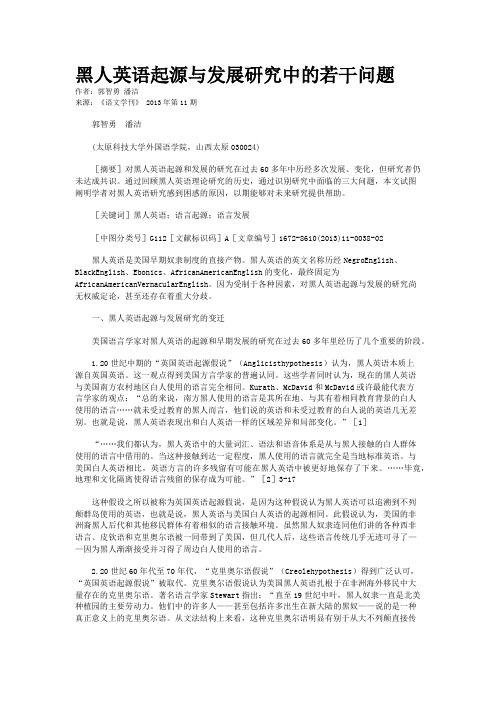
黑人英语起源与发展研究中的若干问题作者:郭智勇潘洁来源:《语文学刊》 2013年第11期郭智勇潘洁(太原科技大学外国语学院,山西太原030024)[摘要]对黑人英语起源和发展的研究在过去60多年中历经多次发展、变化,但研究者仍未达成共识。
通过回顾黑人英语理论研究的历史,通过识别研究中面临的三大问题,本文试图阐明学者对黑人英语研究感到困惑的原因,以期能够对未来研究提供帮助。
[关键词]黑人英语;语言起源;语言发展[中图分类号]G112[文献标识码]A[文章编号]1672-8610(2013)11-0038-02黑人英语是美国早期奴隶制度的直接产物。
黑人英语的英文名称历经NegroEnglish、BlackEnglish、Ebonics、AfricanAmericanEnglish的变化,最终固定为AfricanAmericanVernacularEnglish。
因为受制于各种因素,对黑人英语起源与发展的研究尚无权威定论,甚至还存在着重大分歧。
一、黑人英语起源与发展研究的变迁美国语言学家对黑人英语的起源和早期发展的研究在过去60多年里经历了几个重要的阶段。
1.20世纪中期的“英国英语起源假说”(Anglicisthypothesis)认为,黑人英语本质上源自英国英语。
这一观点得到美国方言学家的普遍认同。
这些学者同时认为,现在的黑人英语与美国南方农村地区白人使用的语言完全相同。
Kurath、McDavid和McDavid或许最能代表方言学家的观点:“总的来说,南方黑人使用的语言是其所在地、与其有着相同教育背景的白人使用的语言……就未受过教育的黑人而言,他们说的英语和未受过教育的白人说的英语几无差别。
也就是说,黑人英语表现出和白人英语一样的区域差异和局部变化。
”[1]“……我们都认为,黑人英语中的大量词汇、语法和语音体系是从与黑人接触的白人群体使用的语言中借用的。
当这种接触到达一定程度,黑人使用的语言就完全是当地标准英语。
黑人英语与标准英语

2.复数形式的差异
• 2.1 在表示数量的短语中,复数形式的后缀 常被省略:seven year ago, two cup of coffee.
• 2.2 有些词只需变化词尾:foot—foots • 2.3 在标准英语的复数形式后加s: men—
现,如Marry, she happy.黑人英语是用 这种独特的形式来表示强调。
• 4.3 标准英语靠颠倒次序以构成直接问句: What’s that?黑人英语要求把动词放在主 语后:What that is?在间接问句中,从
句的情态动词还可前移,黑人英语甚至把
I wonder where she can go 变为 I wonder can she go where.在Why he look it 一类句中,则仅用升调来体现
美国黑人英语与 标准英语
• 黑人英语是美国英语中分布最广,最 为人们所熟悉的少数族裔变体语言。 从语言学上说,当代美国黑人英语与 白人标准英语的最大区别在于语法结 构上,如系动词be的使用模式,复数形 式的差异,动词时态的特殊用法等。 从黑人英语的语法结构中我们可以看 出黑人英语的特点及其与美国英语标 准英语的差异。
1 系动词“be”的使用模式
1.1 黑人英语中,动词“be” 主要用于表明习 惯性或经常性发生的情况,假如状态或事 件不是经常性发生或反复发生的,be就被 省略,如:”The coffee is cold”,意为 “Everyday the coffee is cold ”。而 “The coffee cold”意为“Today the coffee is cold”.
• Natasha go to United States. (Black English)
黑人英语汉译初探
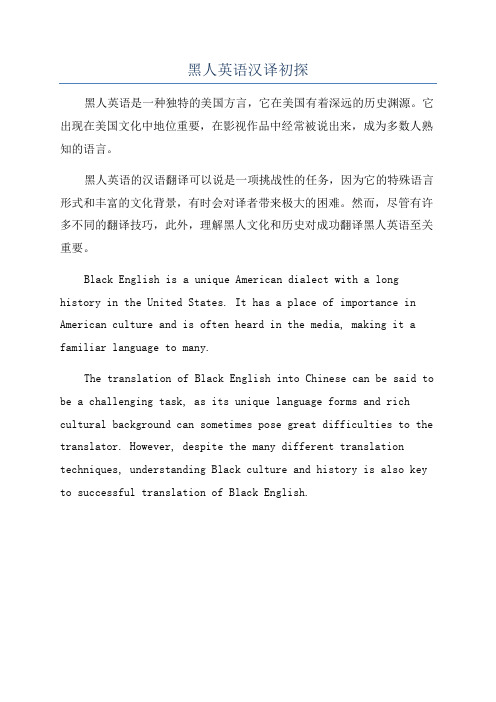
黑人英语汉译初探
黑人英语是一种独特的美国方言,它在美国有着深远的历史渊源。
它出现在美国文化中地位重要,在影视作品中经常被说出来,成为多数人熟知的语言。
黑人英语的汉语翻译可以说是一项挑战性的任务,因为它的特殊语言形式和丰富的文化背景,有时会对译者带来极大的困难。
然而,尽管有许多不同的翻译技巧,此外,理解黑人文化和历史对成功翻译黑人英语至关重要。
Black English is a unique American dialect with a long history in the United States. It has a place of importance in American culture and is often heard in the media, making it a familiar language to many.
The translation of Black English into Chinese can be said to be a challenging task, as its unique language forms and rich cultural background can sometimes pose great difficulties to the translator. However, despite the many different translation techniques, understanding Black culture and history is also key to successful translation of Black English.。
- 1、下载文档前请自行甄别文档内容的完整性,平台不提供额外的编辑、内容补充、找答案等附加服务。
- 2、"仅部分预览"的文档,不可在线预览部分如存在完整性等问题,可反馈申请退款(可完整预览的文档不适用该条件!)。
- 3、如文档侵犯您的权益,请联系客服反馈,我们会尽快为您处理(人工客服工作时间:9:00-18:30)。
THE PRIIMARY CAUSE:: RACIAL DISCRIMINATION
whites’..
phonolor grammatical characteristics
Tense and Aspect.
Word-final devoicing of /b/, /d/, and /ɡ/, whereby for example cub sounds like cup Reduction of certain diphthong forms to monophthongs. /aI/ - [aː] Conversely, older speakers in some regions (such as the American South) may use [oɪ]-[oʊ] AAVE speakers may not use the fricatives: Word-initially, /θ/ is normally the same as in other English dialects (so thin is [θɪn]). Word-initially, /ð/ is [d] (so this is [dɪs]). Word-medially and -finally, /θ/ is realized as either [f] or [t].
The words it and they denote the existence of something, equivalent to standard English's there is, or there are. Altered syntax in questions.
Usage of personal pronoun "them" instead of definite article "those".
Use of ain't as a general negative indicator.
Negative concord, popularly called "double negation"
In a negative construction, an indefinite pronoun such as nobody or nothing can be inverted with the negative verb particle for emphasis
BLACK
What is black English?
Black English is a . term used for both dialects of English and English-based pidgins and Creoles, and whose meaning depends considerably upon the context, and particularly the part of the world.
1 )The Slave trade. 2 ) The influence of native language 3 ) Primary cause : Racial Discrimination.
SLAVE TRADE One theory is that the Black English arose from one or more slave Creoles that arose from the trans-Atlantic African slave trade and the need for African captives to communicate among themselves and with their captors.
THE INFLUENCE OF NATIVE ENGLISH When black people were sold to the America, they were young , and could master their native language-the African English ,and its grammar well. The syntax rules and the way of thinking of African English were transferred to English. So when African slaves attempted to learn English, their native language got in the way.
